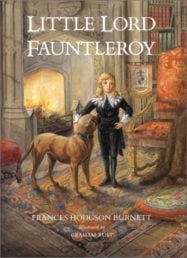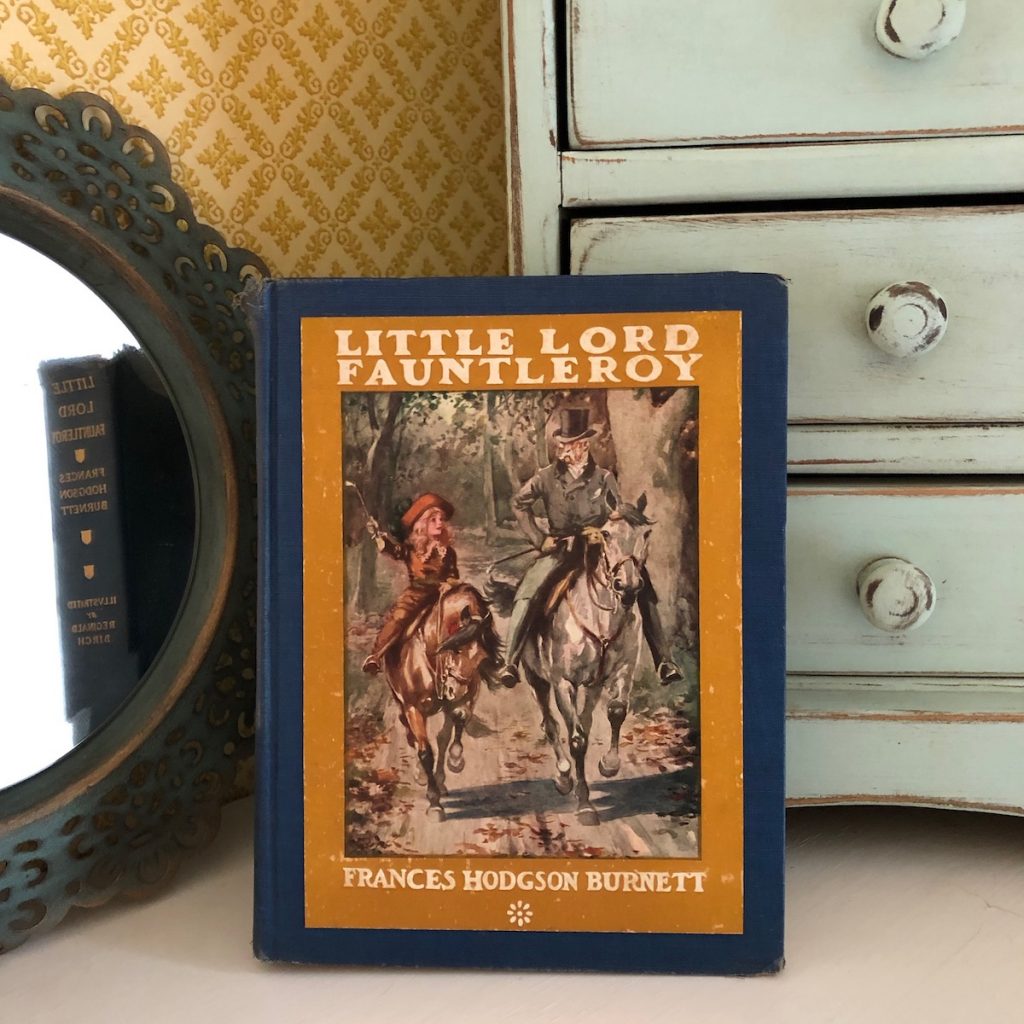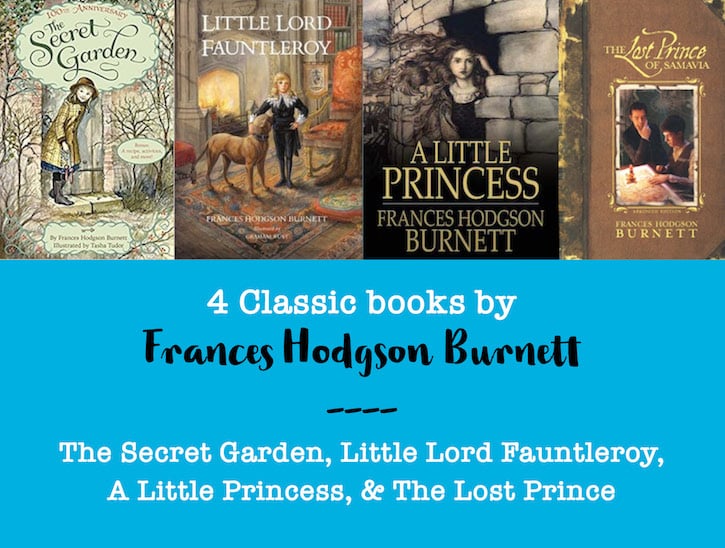Little Lord Fauntleroy by Frances Hodgson Burnett
By Aiyana Edmund | On February 13, 2018 | Updated December 18, 2020 | Comments (0)

Little Lord Fauntleroy by Frances Hodgson Burnett was the British-American author’s first novel for children. The story was published as a serial in the St. Nicholas Magazine from November 1885 through October 1886 and released as a book later in 1886.
The novel’s illustrations would later inspire fashion trends throughout Europe and America — often to the chagrin of little boys who were compelled to wear them.
The story follows the journey of a little boy who goes to live with his bitter grandfather in England, after he unexpectedly inherits a lofty British title and a great deal of wealth. Burnett skillfully threads the story with timeless themes of family and kindness, creating a classic book relatable across all ages.
The inspiration for Little Lord Fauntleroy
Burnett, her husband, and son left Knoxville, Tennessee, for a European trip abroad while pregnant with her second child. Their expenses were to be partly covered by earnings from her writing, giving the family time to travel before settling in Paris, where her younger son Vivian was born.
While Burnett’s husband, Dr. Swan Burnett, set up his practice, Burnett supported the family with her writing. Vivian, nicknamed “Little Calamity,” is thought to have inspired the character of Little Lord Fauntleroy.
To save money, Burnett tried her hand at sewing, becoming the boys’ personal seamstress, designing and sewing their clothing. The result of her crafting led to the uniform worn by the fictional little lord, and soon spread as a fashion sensation across Europe and America.
Much of Vivian’s personality and early achievements (he took his first steps at nine months) are attributed to the development of Burnett’s Little Lord character. After the serialization, the book was an immediate hit, with ten thousand copies sold in a week; the English edition also broke through as a best-seller.
William Ewart Gladstone, the British prime minister, proclaimed that “the book will have great effect in bringing about added good feeling between the two nations.”
. . . . . . . . . .
4 Classic Books by Frances Hodgson Burnett
. . . . . . . . . .
A lawsuit and successful stage adaptations
While Burnett may be most notably known for The Secret Garden and A Little Princess, the tale of this little lord generated stage and film adaptations, and resulted in a lawsuit.
In 1888, Burnett discovered her story had been plagiarized as a play. She sued (and won), and went on to produce her own theatrical version of her book. The play opened May 14, 1888 and was performed in London, France, Boston, and New York City. Decades later, film and television adaptations developed as well, helping ensuring the tale’s legacy.
. . . . . . . . . .

. . . . . . . . . .
Quotes from Little Lord Fauntleroy
“She said that perhaps it was not so easy to be very rich; that if any one had so many things always, one might sometimes forget that every one else was not so fortunate, and that one who is rich should always be careful and try to remember.”
. . . . . . . . . .
“To see each of his ugly, selfish motives changed into a good and generous one by the simplicity of a child was a singular experience.”
. . . . . . . . . .
“It had never occurred to his honest, simple little mind that there were people who could forget kindnesses.”
. . . . . . . . . .
“But only be good, dear, only be brave, only be kind and true always, and then you will never hurt any one, so long as you live, and you may help many, and the big world may be better because my little child was born.”
. . . . . . . . . .
“Everything was not as picturesque when seen near by, as it looked from a distance. She had found idleness and poverty and ignorance where there should have been comfort and industry.”
. . . . . . . . . . .

Frances Hodgson Burnett books on Bookshop.org*
Frances Hodgson Burnett page on Amazon*
. . . . . . . . . .
How the story begins …
The first few opening paragraphs from Chapter One of the charming story are as follows:
Cedric himself knew nothing whatever about it. It had never been even mentioned to him. He knew that his papa had been an Englishman, because his mamma had told him so; but then his papa had died when he was so little a boy that he could not remember very much about him, except that he was big, and had blue eyes and a long mustache, and that it was a splendid thing to be carried around the room on his shoulder.
Since his papa’s death, Cedric had found out that it was best not to talk to his mamma about him. When his father was ill, Cedric had been sent away, and when he had returned, everything was over; and his mother, who had been very ill, too, was only just beginning to sit in her chair by the window. She was pale and thin, and all the dimples had gone from her pretty face, and her eyes looked large and mournful, and she was dressed in black.
“Dearest,” said Cedric (his papa had called her that always, and so the little boy had learned to say it),—“dearest, is my papa better?”
He felt her arms tremble, and so he turned his curly head and looked in her face. There was something in it that made him feel that he was going to cry.
“Dearest,” he said, “is he well?”
Then suddenly his loving little heart told him that he’d better put both his arms around her neck and kiss her again and again, and keep his soft cheek close to hers; and he did so, and she laid her face on his shoulder and cried bitterly, holding him as if she could never let him go again.
“Yes, he is well,” she sobbed; “he is quite, quite well, but we—we have no one left but each other. No one at all.”
Then, little as he was, he understood that his big, handsome young papa would not come back any more; that he was dead, as he had heard of other people being, although he could not comprehend exactly what strange thing had brought all this sadness about.
More about Little Lord Fauntleroy by Frances Hodgson Burnett
- Wikipedia
- Review on American Heritage
- Full text version on Project Gutenburg
- Reader discussion on Goodreads
- 1936 film adaptation of Little Lord Fauntleroy
. . . . . . . . . .
*These are Bookshop Affiliate and Amazon Affiliate links. If a product is purchased by linking through, Literary Ladies Guide receives a modest commission, which helps maintain our site and helps it to continue growing!

Leave a Reply